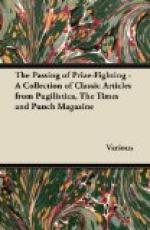Miss Messalina Stoot, who punctuated her remarks with the clashing of a pair of cymbals, observed that as a thorough-going Dadaist she had no sympathy with the half-hearted attitude of the Chairman. It was a battle between Dada and Gaga, and emphatically Dada must win.
Mr. Mimram Stoot, who accompanied himself on the sarrusophone, endorsed the iconoclastic views of his sister. The only poetry that counted was that which caused spinal chills and issued from husky haughty lips. The moanings of mediaeval molluscs were of no avail, though they might excite the crustacean fossils of Oxford, the home of lost causes.
Mr. Seumas O’Gambhaoil wished to protest against Mr. NOYES’ statement that there were ten thousand Bolshevist poets in our midst. This was a shameless underestimate of the total, which was at least twice that figure. Mr. GODLEY’S offence, however, was much worse, as he was an Irishman, though of the self-expatriated type to which GOLDSMITH and MOORE belonged. The rest of Mr. O’Gambhaoil’s speech was delivered in Irish, but he was understood to advocate a repatriation of all Irish renegades to be tried and dealt with by the Sinn Fein Republic.
Mr. Caradoc Cramp applauded the sentiments of the last speaker, but considered that he avoided the real issue. The Chairman had declared himself a Georgian, but that was not enough. The worst enemies of Free Verse were to be found in that camp. In technique and even in thought there was little to choose between many so-called Georgians and the most effete and reactionary Victorians. He alluded to the War poets, or rather the “Duration” poets, most of whom were already back-numbers. Between these and the Post-war poets, the true super-Georgians or paulo-post-Georgians, it was necessary to make a clean cut. To protest against Messrs. GODLEY and NOYES was a mere waste of time and energy. They might just as well protest against the existence of an extinct volcano or the skeleton of the brontosaurus. The real danger to be faced was the intrinsic subjectivity of the early and mid-Georgian poets, of whom the Chairman had been so powerful and consistent a supporter. He accordingly called for volunteers to storm the platform, and, a large number having responded to his appeal, Mr. MARSH was dislodged from the Chair after a gallant fight. A resolution of adherence to the principles of “Dada” having been passed by a large majority, the meeting broke up to the strains of the famous song—




